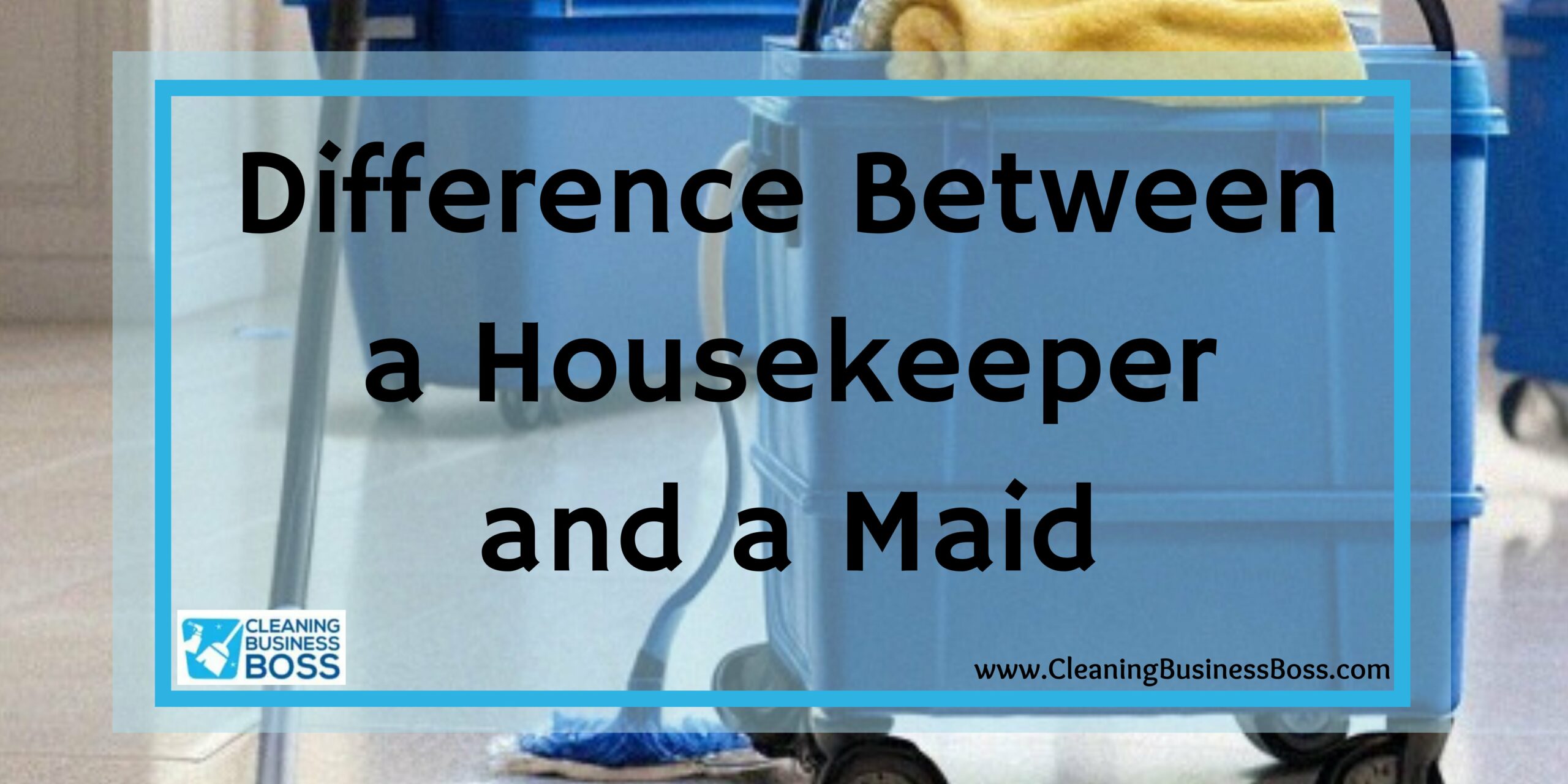By taking the time to read this article, it’s clear, you’re looking for someone with experience and honesty, someone who is able to answer your cleaning business questions. Using my experiences, I will explain the differences between a housekeeper and a maid. If you’re looking to hire a housekeeper or a maid, or looking to work in these positions yourself, this article will provide you with all the information you need.
The biggest differences between a housekeeper and a maid are the prices they charge, the types of work they do, and their availability. On one hand, maids offer services that focus on the upkeep of their customer’s houses. Housekeepers, on the other hand, generally run errands and perform routine tasks for their customers, while also performing the tasks of a maid.
Because maids are different from housekeepers, it’s important to recognize the exact services each one provides.
The Services of Maids and Housekeepers
Maids
While housekeepers work “around the house”, maids work “on the house”. By “on the house”, I’m talking about the rooms and structures that occupy a home. This includes bathrooms, kitchens, bedrooms, and any place within a home that requires upkeep. Maids also clean structures of the house, such as statues or tables.
For maids, different messes require different amounts of cleaning. For instance, bathtubs and showers do not require daily cleaning, while a task, like dusting, is more frequent. Because of this, maids offer the specialty of getting a house as clean as possible in the shortest amount of time. In other words, maids do not fold customers’ clothes or wash their dishes. Tasks, like such, do not involve cleaning the rooms or structures of a home. For further clarification, some examples of what maids do would be:
- Dusting light fixtures
- Cleaning kitchen countertops
- Cleaning appliances
- Mopping bathroom tile
- Emptying trash cans
- Cleaning bathtubs and showers
- Changing linens
The job of a maid is to keep a house Sanitary and Presentable. Choosing a maid is a fantastic option for people who don’t have time to clean the inside of an oven, but still have time to do their laundry. Overall, compared to housekeepers, maids focus solely on cleaning and provide minimal services.
Housekeepers

Unlike a maid, housekeepers perform the services that maids do not. However, housekeepers perform all the same tasks that maids do. So, “Why even hire a maid?”, you might ask.
Even though housekeepers perform the same tasks as maids, they do not specialize solely in cleaning. Housekeepers will clean a house, just not to the extent that a maid will. This is due to the extra tasks that housekeepers perform. Generally, they are far busier. Because maids are busier, they will clean the inside of an oven and a bathtub, just not as urgently as a maid. As I’ve mentioned before, they work “around the house”. This means that, unlike maids, housekeepers will fold a customer’s clothes and wash their dishes. They offer all the services of a maid, all while doing the chores of their clients. Some examples of housekeeping services include:
- Folding clothes
- Dusting lights
- Making beds
- Washing dishes
- Babysitting
- Cleaning appliances
- Feeding pets
- Cooking
- Simple home repairs
As you can see, a housekeeper offers more service variety and skill sets to their customers. They aren’t hired solely to clean; they are hired as a helping hand in someone’s home. Unlike maids, housekeepers can build much closer relationships with their customers and families. Because of this, they’re often more in-demand by customers, affecting both cost and availability.
Check out this article to get idea how much a cleaning business owner can make.
The Costs of Service 
Even though housekeepers offer more services than maids, there is no set price. Just because housekeepers babysit, and maids do not, a maid may still charge more. This is because pricing for either party is based on factors. The factors are availability, demand, types of work, travel, supplies, and tips.
Some factors, like availability or demand, cannot be changed. For both maids and housekeepers, the higher they are demanded, the higher their prices will be. This same rule applies to availability. They charge more if an appointment causes them to be overbooked. This could cause them to miss a high paying appointment. By accepting one appointment, they risk losing money from another.
As you can see, a factor like demand independently affects pricing. However, factors like types of work, or tips, will be a variable cost in determining the overall price.
Despite all of this, housekeepers tend to charge more for the same type of work a maid would be hired for. As I’ve mentioned, housekeepers have a larger skill set than maids. They’re not just charging for the work they do, they’re charging for the skills they possess. Some customers will hire housekeepers while expecting a maid. These customers find themselves to be surprised. All they wanted was a cleaning; only to find out that the housekeeper can also do their laundry and change their light bulbs. Other times, customers will hire a maid (thinking they’re housekeepers), only to be disappointed. The confusion between housekeepers and maids are all too common, hence the reason housekeepers will charge more than maids upfront.
When a maid calculates how much to charge a customer, they base it on:
- Travel
- Cleaning supplies
- Business legalities
- Labor
- Square footage
- Condition of home
- Amount of pets
Housekeepers will charge a customer based on:
- Travel
- Cleaning supplies
- Business legalities
- Labor
- Square footage
- Condition of home
- Meals cooked
- Laundry
- Shopping reimbursements
- Amount of pets
- Kids
The method of charging customers for these services are generally through gratuities or “tipping”. Most times, tips are charged in addition to hourly pay. Unlike maids, housekeeping tasks vary throughout the day. In order to compensate for any extra work that might be performed, tips are mandatory for consistent service. Customers will tip housekeepers based on the amount of work they do, or if they perform extra favors. The purpose of tipping is for customers to build trust, work ethic, and consistency with housekeepers. For many clients, they will gladly pay extra money for someone who does good work and matches their availability.
Does a janitorial service make a lot of money? Check out this article to know the answer.
Availability

As I’ve mentioned previously in this article, housekeepers can make their income exclusively from one or two families for long periods of time. Like so, this can also be the case with a maid. More often than not, a good maid will stay with a customer for years when the client owns a large property. With a large property, maids get tipped well, and customers will keep them hired for their knowledge of the property. Much like the pricing of maids and housekeepers, the flexibility of their schedules depends on how they run their businesses. Some maids will clean several small homes within a week. Other maids are exclusive to one family, but maybe looking for extra cash on the side.
Pricing is a big factor in how available a housekeeper will be. For housekeepers and maids with several quick appointments, they will go where there is the most money. For housekeepers that work with families, they will not give up an appointment for a new client. Even if a new client is paying very well. By canceling an appointment with a long term client, they lose a steady stream of income.
Aside from cash, maids and housekeepers use time management skills to determine the jobs they work. If a housekeeper or maid is familiar with a home and its size, they can estimate how long that home will take to clean. When a house takes a whole day to clean, other appointments will be considered fully booked for the day. Housekeepers especially aren’t as flexible with their availability. Because housekeepers have an unpredictable task list of what their clients will want for the day, it’s important for them to be strict with their schedule. Clients can choose to reschedule or find another cleaning service.
Because full availability is hard to find, it’s not uncommon for customers to have their housekeepers live in their homes. In France, it’s common practice to hire what is known as an “au pair”, or “Equal to”. In situations like these, the exchange for housekeeping services is room and board. While most of these live-in circumstances are common, they will not be common for housekeepers just getting started on a new business. Most live-in situations happen when a customer has a major life change, like a baby, but still needs the service of a long time housekeeper. Events like these are an example of the emphasis on availability.
As with any business, maids and housekeepers will mention their availability before they are hired. By listing their availability and understanding the trends of their business, they can give their customers accurate pricing and consistent service. This makes it easier for potential clients to distinguish the difference between a maid and a housekeeper.
Frequently Asked Questions
Do maids charge off of tips?
Yes, maids charge tips based on the size of the house they clean. However, because maids don’t have a varied task list, typically they don’t require tips as frequently as housekeepers.
Can maids cook or fold, but still be considered a maid?
Yes, they can. These types of maids will usually list their specialty ahead of time (i.e., kitchen maids, nanny, laundry maid).
To learn more on how to start your own cleaning business, check out my startup documents here.
Please note that the contents of this blog are for informational and entertainment purposes only and should not be construed as legal advice. Any action taken based on the information provided in this blog is solely at your own risk. Additionally, all images used in this blog are generated under the CC0 license of Creative Commons, which means they are free to use for any purpose without attribution.

About the author. Entrepreneur and Cleaning Business Fan.
Hi! I am Shawn and I am a happy individual who happens to be an entrepreneur. I have owned several types of businesses in my life from a coffee shop to an import and export business to an online review business plus a few more and now I create online cleaning business resources for those interested in starting new ventures. It’s demanding work but I love it. I do it for those passionate about their business and their goals. That’s why when I meet a cleaning business owner, I see myself. I know how hard the struggle is to retain clients, find good employees and keep the business growing all while trying to stay competitive.
That’s why I created Cleaning Business Boss: I want to help cleaning business owners like you build a thriving business that brings you endless joy and supports your ideal lifestyle.


